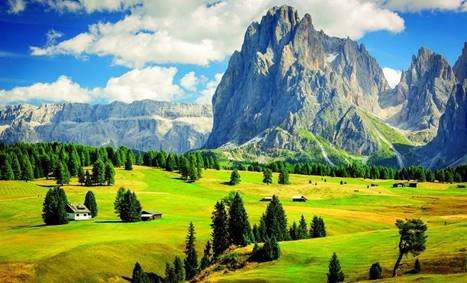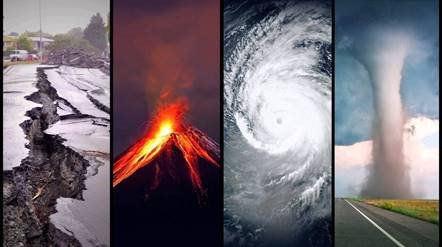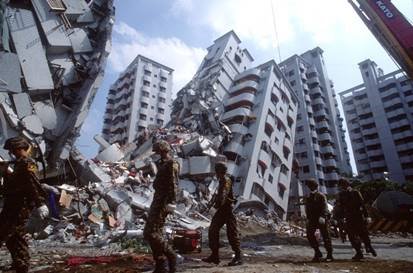Урок-конференція у 8 класі “Natural disasters and extreme weather”
Урок-конференція у 8 класі “Natural disasters and extreme weather”
Objectives: to inform students with the main rules of behavior in case of natural disasters; to practise the learnt lexics on the topic; to develop students ’ listening, reading, speaking, writing skills; to practise the use of the first conditionals; to develop students ’ critical thinking; to educate the culture of communication socio-cultural awareness.
Equipment : cards with tasks ( HO ); workbook form 10, O. Karpiuk; pictures; video “Protect your home from lightning”; pupil’s video presentation “What to do during an earthquake”; teacher’s Power Point presentation; song “Drop. Cover. Hold” ( video ).
PROCEDURE
I Greeting. Warming up
T. Good morning, students . I’m glad to see you . Welcome to our home, planet Earth! Look at these pictures ( teacher’s presentation, slide 2 ). Is our planet beautiful?

S.Our planet is very beautiful. It has picturesque landscapes, high mountains and cosy valleys, deep rivers, seas and oceans, green forests and sandy deserts. The Earth gives us its beauty in all seasons.
T. Is nature always calm and quiet? ( slide 3 )
S. No, it isn’t. Every year big and small natural disasters occur in different partsof the world.
T. Let’s name some of them. Look at the screen and guess the natural disasters( unscrambled words - slides 4, 5, 6, 7 ). And now match the words with their definitions ( slides 8, 9, 10, 11 ).
T. You see that a lot of natural disasters affect the environment. How often do they happen? S. Some of them happen very often, but some of them are a big shock. T. What natural disasters can occur in Ukraine?
S. Thunderstorms, floods, droughts, forest fires, hurricanes, snowfalls, blizzards.

T. How do natural disasters affect nature and people?
S. Natural disasters lead to financial, environmental and human losses.Tornadoes can affect ships, blow down houses, cause floods and disrupt traffic. Volcano eruptions can kill people and destroy towns. Floods damage roads, underflood and destroy houses, farmlands, crops. Tsunami washes away coastlines. Landslides block roads and can injure people. Earthquakes destroy buildings and roads.
T. Can people prevent natural disasters?
S. No, they can’t. But by providing real-time information about floods,earthquakes and other disasters we can respond effectively when disaster strikes.
T. I agree with you. We must know what to do and how to behave in case ofnatural disasters. And today we’ll speak about it. So, the topic of our lesson is “What should we do in case of natural disasters” ( slide 12 ).
What proverbs and quotations about nature do you remember? II. THE MAIN PART OF THE LESSON
1. Listening and watching the video “Protect your home from lightning”.
a) Pre-listening activity
T. What natural disasters are the most frequent in our region? Lightnings and thunderstorms are among them. You will watch a video about lightning
b) While-listening activity
T. Listen and watch the video and do the task ( cards ).
Protect your home from lightning
Listen and underline the correct words:
1. A good shelter from lightning is a building / a tree.
2. Open spaces are safe / unsafe places during a thunderstorm.
3. If you are indoors during a thunderstorm you may use / must avoid water.
4. Stay near / away from windows and doors.
c) After-listening activity
Grammar practice( cards )
Variant I
Put the verbs in brackets into the correct tense to make the 1st Conditional
|
sentences. 1. If I _______ ( see ) the lightning, I __________________ ( seek ) shelter. 2. If I ________ ( be ) in the street, I __________________ ( stay ) away from metal objects. 3. If a thunderstorm ____________ ( start ), I ___________________ ( not / stand ) under a tree. |
|
Variant II Put the verbs in brackets into the correct tense to make the 1st Conditional sentences. 1. If I _______ ( be ) in a car, I ________________ ( shut ) the windows. 2. If I _________ ( stay ) indoors during a thunderstorm, I ________________ ( not / use ) a mobile phone. 3. If a thunderstorm _____________ ( start ), I _________________ ( turn off ) computers and TV sets. |
T. Let’s check your work. Compare your variants with the sentences on the screen ( teacher’s presentation “1st Conditionals. Exercises” )
2. Presentation of the pupil’s project – “What to do during an earthquake”
( video presentation ) http://goo.gl/CZrhrI
What to do during an earthquake?

At school
As soon as the earthquake starts, students should get under the desks immediately and wait until the teacher tells them it is safe to come out. The teacher should, at the same time, go immediately to the teacher's desk, get underneath it and stay there till the danger is over. Students must not argue with the teacher or question instructions. As soon as the vibration stops, all students should walk towards the exit and go straight to the school playground or any open space such as a square or a park. They must wait there until the teacher tells them it is safe to go. Whatever you do, don’t panic: most accidents occur not as a result of the earthquake itself but from people panicking.
At home
If you are at home when the earthquake occurs, get immediately under the table in the living room or kitchen. Choose the biggest and strongest table you can find. You must not go anywhere near the windows and don't go out onto the balcony. Once the shaking have stopped, you can come out from under the table but you must leave the building straight away. You should walk down the stairs and should not use the lift—there may be a power cut as a result of the earthquake and you could find yourself trapped inside the lift for hours.
In the street
If you are in the street when the earthquake takes place, do not stand near buildings, fences or walls—move away as quickly as possible and try to find a large open space to wait in. Standing under trees could also be dangerous.
a) Pre-watching activity.
T. Do earthquakes occur in Ukraine? Are they intensive? You will watch Olena’s video presentation “What to do during an earthquake”. Listen and watch attentively and do the task.
b) While-watching activity
Match the parts of the sentences:
|
1. As soon as the earthquake starts, students should… |
a. to the teacher’s desk and get underneath it. |
|
2. Students should wait until the teacher… |
b. get under the desks. |
|
3. As soon as the earthquake starts, the teacher should go … |
c. go to any open space such as a square or a park. |
|
4. As soon as the vibration stops, students should … |
d. try to find a large open space to wait in. |
|
5. If you are at home when the earthquake starts… |
e. tells them it is safe to come out. |
|
6. If you are in the street when the earthquake starts… |
f. get under the table in the living room or kitchen. |
T. Check yourself ( slide 13 ).
c) After-watching activity
Complete the table: ( slides 14, 15, 16 )
If an earthquake occurs … 3. Relaxation
Singing a song https://www.youtube.com/watch?v=oTwBp9DywfU
4. Vocabulary practice and speaking Pairwork
T. Look at these things ( pictures on the blackboard ). You need them in case of a disaster to survive and to rescue other people. Name these things ( a whistle, a life jacket, a fire extinguisher, a torch, a mobile phone, a life belt, a first aid kit, an axe ).
Then ask and answer in pairs as in the example ( Workbook, ex. 1 page 61 ):
- What do you need in case of an earthquake?
- You need a whistle to attract attention.
|
items |
reason to use |
|
a whistle a life jacket a fire extinguisher a torch a mobile phone a life belt a first aid kit an axe |
attract attention prevent yourself from drowning put out a fire find your way call for help swim safely to the beach treat a wound cut ropes |
III. SUMMARY Evaluation
T. Let’s sum up what we’ve spoken about at the lesson.
Ps. We have spoken about different natural disasters. We have learnt what we should do in case of lightning and an earthquake.
T. Thank you for your active and excellent work. I hope you have enjoyed all the activities. Your marks are …
Homework
Your home task for the next lesson is: to make a poster “If an earthquake occurs…”


про публікацію авторської розробки
Додати розробку
